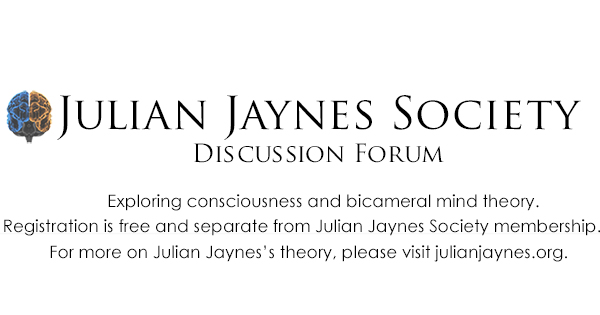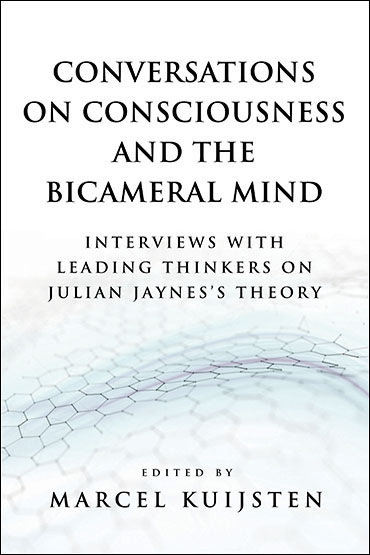Bicameral Mind A Symptom of Neurological Degeneration?
Bicameral Mind A Symptom of Neurological Degeneration?
When I 1st read Origin around ten years ago I was most pleased to find a book that offered general support for the theory I was developing. That situation remains the same however I considered the bicameral phase as the latter stages of a degenerative neurological condition. I suspect that until around 200kyrs ago (when the rapid neural expansion stalled) humans were in possession of a most remarkable piece of equipment. A consciousness system with unparalleled ability comprising two functionally identical half’s. Due to an inherited and progressive neuro-endocrine condition one half of the brain suffered increasing structural distortion during foetal development. This created two functionally distinct entities sharing the same cranium. As the damage accrued the associated loss of function created a psychology of fear this in turn a drive to control. The shift from an obvious bicameral state to a singular sense of I (except when it breaks down) was not the emergence of an advanced state of consciousness but the final domination of a very degenerate state of consciousness facilitated by the left side of the brain. It is (or we are) blithely unaware of this condition as the tool we use to assess our selves with is utterly unable to see its own dysfunction.
Bicameral Mind a Symptom of Neurological Degeneration?
Hi Tony,
your posting is very interesting for me: the I as a degenerative function on a neurological basis. Do you have more links or ressources for this thesis?
I also like the idea of a software evolution, as Daniel Dennett calls it. Do you know about memetics and especially the ideas from Susan Blackmore, e.g. the Selfplex?
May the neurological and the memetic approach can be integrated to explain the origin in a more detailed way?
The connection between fear and control is very essential to the development of our social structures. Power and control are the basic forces which form our societies and the history of our social relations. All "advanced" societies had a very clear power structure and I think that fear of inner or outer enemies was a very important source to keep this structure working. But where does the fear come from? Do Animals have fear in the way humans have? When did humans develop this special kind of fear?
CU,
Holmes
your posting is very interesting for me: the I as a degenerative function on a neurological basis. Do you have more links or ressources for this thesis?
I also like the idea of a software evolution, as Daniel Dennett calls it. Do you know about memetics and especially the ideas from Susan Blackmore, e.g. the Selfplex?
May the neurological and the memetic approach can be integrated to explain the origin in a more detailed way?
The connection between fear and control is very essential to the development of our social structures. Power and control are the basic forces which form our societies and the history of our social relations. All "advanced" societies had a very clear power structure and I think that fear of inner or outer enemies was a very important source to keep this structure working. But where does the fear come from? Do Animals have fear in the way humans have? When did humans develop this special kind of fear?
CU,
Holmes
Hi Tony,
your posting is very interesting for me: the I as a degenerative function on a neurological basis. Do you have more links or resources for this thesis?
I also like the idea of a software evolution, as Daniel Dennett calls it. Do you know about memetics and especially the ideas from Susan Blackmore, e.g. the Selfplex?
May the neurological and the memetic approach can be integrated to explain the origin in a more detailed way?
The connection between fear and control is very essential to the development of our social structures. Power and control are the basic forces which form our societies and the history of our social relations. All "advanced" societies had a very clear power structure and I think that fear of inner or outer enemies was a very important source to keep this structure working. But where does the fear come from? Do Animals have fear in the way humans have? When did humans develop this special kind of fear?
CU,
Holmes
Probably best to check out my website [broken link removed] to save repeating whats already available. Yes, aware to some degree of Blackmore, Dawkins etc. I see the whole thing as the as the product of a deluded and limited state of mind ie the phenomena not the theory, though of course same applies.
Fear is a response to increasing loss of function and an inability to experience or understand the incomprehensible/indeterminate world we inhabit/are. So we create systems structure ideas to substitute for experiential reality. Anything that challenges our contrived sense of self/identity is ignored suppressed etc.
your posting is very interesting for me: the I as a degenerative function on a neurological basis. Do you have more links or resources for this thesis?
I also like the idea of a software evolution, as Daniel Dennett calls it. Do you know about memetics and especially the ideas from Susan Blackmore, e.g. the Selfplex?
May the neurological and the memetic approach can be integrated to explain the origin in a more detailed way?
The connection between fear and control is very essential to the development of our social structures. Power and control are the basic forces which form our societies and the history of our social relations. All "advanced" societies had a very clear power structure and I think that fear of inner or outer enemies was a very important source to keep this structure working. But where does the fear come from? Do Animals have fear in the way humans have? When did humans develop this special kind of fear?
CU,
Holmes
Probably best to check out my website [broken link removed] to save repeating whats already available. Yes, aware to some degree of Blackmore, Dawkins etc. I see the whole thing as the as the product of a deluded and limited state of mind ie the phenomena not the theory, though of course same applies.
Fear is a response to increasing loss of function and an inability to experience or understand the incomprehensible/indeterminate world we inhabit/are. So we create systems structure ideas to substitute for experiential reality. Anything that challenges our contrived sense of self/identity is ignored suppressed etc.
Greetings!
I am a member of the Julian Jaynes Society. I read the ... Bicameral Mind about 8 or so years ago.
This topic has been a fascination of mine since childhood. I was raised with traditionalist catholics who tried to beat "the fear of god" into me. However, I never had what I will call "existential angst" (though I may perhaps be using the term incorrectly). If an animal with sharp teeth and great strength charges at me, I am afraid. If someone breaks into my house with a gun, I am afraid. But I have never had the fear that some invisible spook in the sky will bitch-slap me if I fail to listen to the dictates of his culturally local minions. Apparently, I am rare.
I am looking at the E.C.R. site. Your theory, or what I have read of so far, rings true to me. I have often noticed that the stereotypical male seems to be brain-damaged. The human brain is capable of so much, yet the same people that act like very good primates will be the loudest to deny that they are related to, and are, primates themselves.
Some of my fascination with the Bicameral Mind theory comes from the fact that I am a poet. My poetry comes out fully fleshed and structured, all it needs is to be transcribed. Plus, I am an obsessive ruminator. My inner voice, while not aural, is very active.
I think that the difficulty in proving the Bicameral Mind theory may be because we do not have access to a fully functional brain from 7K years ago. Is there any solid research into feral children? I would think that this may come closer than schizophrenics, who also have specifically damaged areas and chemical pathways that may be causing the bicameral behavior, rather than a simple organic issue.
How about the ubiquity of written language? I notice that many prominent mystics (certainly not all) did not write anything, what they said was transcribed by others. Could their mystical revelations be atavistic in nature? Could this be why so many have said the same message, the main difference being cultural accretions and familial background, etc.?
Thank you for this stimulating Forum.
Chrys Henderson
I am a member of the Julian Jaynes Society. I read the ... Bicameral Mind about 8 or so years ago.
This topic has been a fascination of mine since childhood. I was raised with traditionalist catholics who tried to beat "the fear of god" into me. However, I never had what I will call "existential angst" (though I may perhaps be using the term incorrectly). If an animal with sharp teeth and great strength charges at me, I am afraid. If someone breaks into my house with a gun, I am afraid. But I have never had the fear that some invisible spook in the sky will bitch-slap me if I fail to listen to the dictates of his culturally local minions. Apparently, I am rare.
I am looking at the E.C.R. site. Your theory, or what I have read of so far, rings true to me. I have often noticed that the stereotypical male seems to be brain-damaged. The human brain is capable of so much, yet the same people that act like very good primates will be the loudest to deny that they are related to, and are, primates themselves.
Some of my fascination with the Bicameral Mind theory comes from the fact that I am a poet. My poetry comes out fully fleshed and structured, all it needs is to be transcribed. Plus, I am an obsessive ruminator. My inner voice, while not aural, is very active.
I think that the difficulty in proving the Bicameral Mind theory may be because we do not have access to a fully functional brain from 7K years ago. Is there any solid research into feral children? I would think that this may come closer than schizophrenics, who also have specifically damaged areas and chemical pathways that may be causing the bicameral behavior, rather than a simple organic issue.
How about the ubiquity of written language? I notice that many prominent mystics (certainly not all) did not write anything, what they said was transcribed by others. Could their mystical revelations be atavistic in nature? Could this be why so many have said the same message, the main difference being cultural accretions and familial background, etc.?
Thank you for this stimulating Forum.
Chrys Henderson
Re: Bicameral Mind A Symptom of Neurological Degeneration?
You might find this article http://www.brainwaving.com/2009/11/17/377/ recently posted on the Beckley Foundation's new site of interest, also the links etc on this page http://beyond-belief.org.uk/node/1
Re: Bicameral Mind A Symptom of Neurological Degeneration?
Hi, recent interview that will likely be of interest if you find Julian Jaynes ideas intriguing
https://www.youtube.com/watch?v=-OVDRYcA_sk
https://www.youtube.com/watch?v=-OVDRYcA_sk


